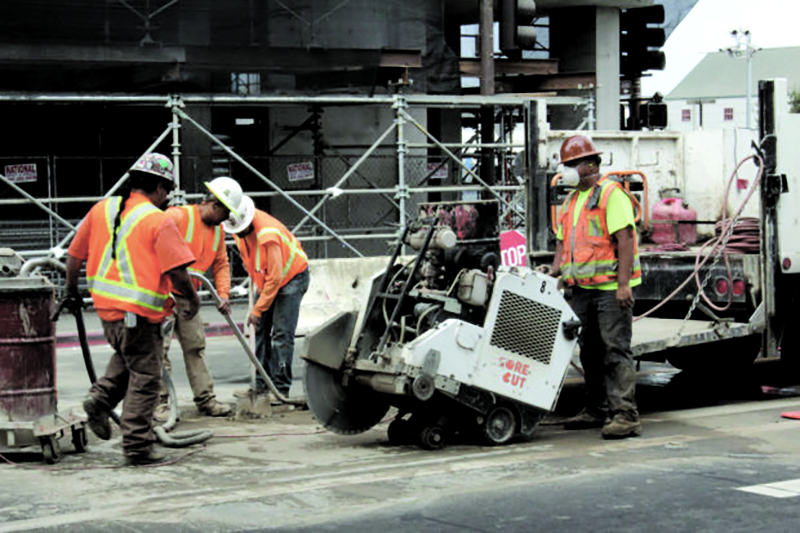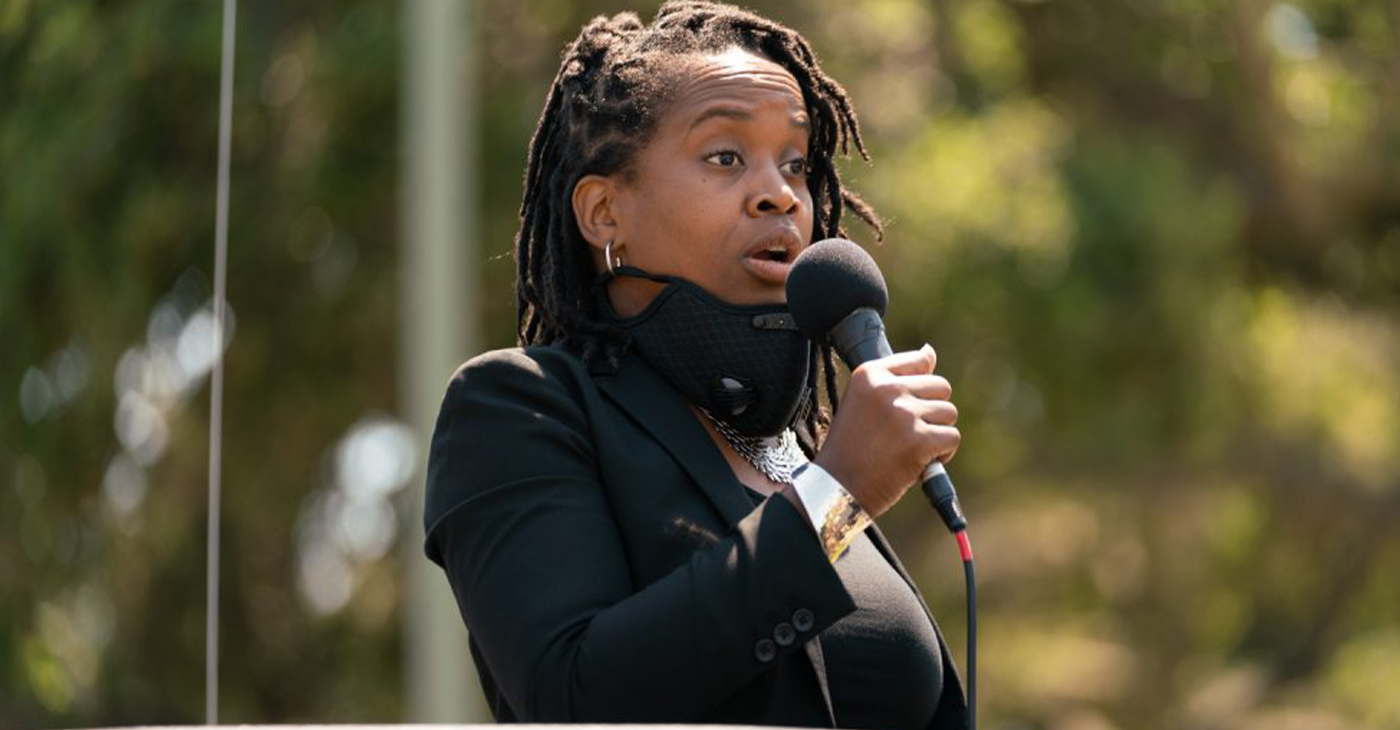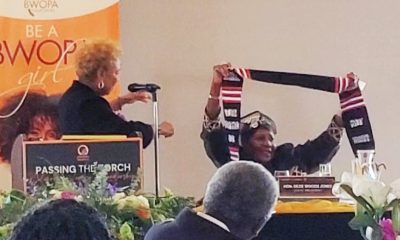City Government
Leaders Respond to Building Trades Threats to Fund Desley Brooks’ Opposition PAC

Councilwoman Desley Brooks has refused to take a position on whether or not the city should adopt a policy which is called a “Project Labor Agreement” until she is given assurances that the PLA will benefit Oakland’s Black community.
In response, the construction unions have threatened to create an Independent Expenditure Committee to fund a negative campaign to help candidates running against her, unless Brooks will agree to vote for this policy.
Why is this a problem? First, coercing the vote of an elected official with threats of money to an unnamed, unaccountable Independent Expenditure Committee feels shady.
And second, we, the authors, are convinced that this city-wide Project Labor Agreement is a bad idea.
We are progressive in Oakland and we tend to support union actions automatically. This is often a good instinct. The Longshore Workers union, teachers’ union, nurses’ union, city worker unions, auto union and many others have created both economic and racial progress with their struggles.
But nobody should get a pass on racial justice.
And many of the construction unions have never gotten over their racial history. African-Americans get only 9 percent of the work on city-funded construction projects, although Black people make up a quarter of Oakland’s population.
The trades are asking for a “Project Labor Agreement,” which means their members will get almost all the work on these city-funded projects, and few of their members are Black.
The trades have consistently refused to release the numbers of people in their unions by ethnicity. So, they are asking the public to turn over our tax dollars to a select set of employees without regard for whether Black people make up a fair share of those employees.
And a walk around Oakland to look at most construction sites makes it clear that they do not. By all the information we can gather, most of the construction unions, especially those with better pay, have few Black members, because of a set of barriers which include various tests, the location of required apprentice training programs far away from Oakland, and others.
A major problem is that African-Americans in Oakland do not currently have the political power to create solutions for their communities. But the issue is much bigger than Black people.
It’s about equity and the moral compass of our city and society as a whole. The City of Oakland’s Equity indicators report confirms that bias and privilege have tangible outcomes build on a history of racism.
Councilmember Desley Brooks is the lone voice that is demanding more, and she is being persecuted for it – a scenario that also has familiar and historic roots.
With the dwindling Black population, the rising cost of living and the widening wealth gap, it is critical that African-Americans have good living wage jobs. We need many champions pushing to make that a reality NOW, not a distant hope or promise for a future that may never come.
We encourage the construction unions to desist from coercing an elected official to do something do something she may have concluded is morally wrong – voting against the employment needs of the African-American community
And we encourage those unions to break down the barriers to Black participation in their unions, so that eventually they will be willing to report openly on the ethnic composition of their membership, and the taxes of Black families will pay for projects on which they are also allowed to work.
Signed (organizations for identification only),
Carroll Fife, Executive Committee, Oakland Branch NAACP;
Kitty Kelly Epstein, PhD, professor of education and urban studies;
Darleen Brooks;
Henry Hitz; executive director emeritus, Oakland Parents Together:
Robyn Hodges
Activism
Oakland Post: Week of December 24 – 30, 2025
The printed Weekly Edition of the Oakland Post: Week of – December 24 – 30, 2025

To enlarge your view of this issue, use the slider, magnifying glass icon or full page icon in the lower right corner of the browser window.
Alameda County
Oakland Council Expands Citywide Security Cameras Despite Major Opposition
In a 7-1 vote in favor of the contract, with only District 3 Councilmember Carroll Fife voting no, the Council agreed to maintain its existing network of 291 cameras and add 40 new “pan-tilt-zoom cameras.”

By Post Staff
The Oakland City Council this week approved a $2.25 million contract with Flock Safety for a mass surveillance network of hundreds of security cameras to track vehicles in the city.
In a 7-1 vote in favor of the contract, with only District 3 Councilmember Carroll Fife voting no, the Council agreed to maintain its existing network of 291 cameras and add 40 new “pan-tilt-zoom cameras.”
In recent weeks hundreds of local residents have spoken against the camera system, raising concerns that data will be shared with immigration authorities and other federal agencies at a time when mass surveillance is growing across the country with little regard for individual rights.
The Flock network, supported by the Oakland Police Department, has the backing of residents and councilmembers who see it as an important tool to protect public safety.
“This system makes the Department more efficient as it allows for information related to disruptive/violent criminal activities to be captured … and allows for precise and focused enforcement,” OPD wrote in its proposal to City Council.
According to OPD, police made 232 arrests using data from Flock cameras between July 2024 and November of this year.
Based on the data, police say they recovered 68 guns, and utilizing the countywide system, they have found 1,100 stolen vehicles.
However, Flock’s cameras cast a wide net. The company’s cameras in Oakland last month captured license plate numbers and other information from about 1.4 million vehicles.
Speaking at Tuesday’s Council meeting, Fife was critical of her colleagues for signing a contract with a company that has been in the national spotlight for sharing data with federal agencies.
Flock’s cameras – which are automated license plate readers – have been used in tracking people who have had abortions, monitoring protesters, and aiding in deportation roundups.
“I don’t know how we get up and have several press conferences talking about how we are supportive of a sanctuary city status but then use a vendor that has been shown to have a direct relationship with (the U.S.) Border Control,” she said. “It doesn’t make sense to me.”
Several councilmembers who voted in favor of the contract said they supported the deal as long as some safeguards were written into the Council’s resolution.
“We’re not aiming for perfection,” said District 1 Councilmember Zac Unger. “This is not Orwellian facial recognition technology — that’s prohibited in Oakland. The road forward here is to add as many amendments as we can.”
Amendments passed by the Council prohibit OPD from sharing camera data with any other agencies for the purpose of “criminalizing reproductive or gender affirming healthcare” or for federal immigration enforcement. California state law also prohibits the sharing of license plate reader data with the federal government, and because Oakland’s sanctuary city status, OPD is not allowed to cooperate with immigration authorities.
A former member of Oakland’s Privacy Advisory Commission has sued OPD, alleging that it has violated its own rules around data sharing.
So far, OPD has shared Flock data with 50 other law enforcement agencies.
Activism
Black Arts Movement Business District Named New Cultural District in California
Located in the heart of District 3, the BAMBD is widely regarded as one of the nation’s most important centers of Black cultural production — a space where artists, entrepreneurs, organizers, and cultural workers have shaped generations of local and national identity. The state’s recognition affirms the district’s historic importance and its future promise.

By Post Staff
Oakland’s Black Arts Movement Business District (BAMBD) has been selected as one of California’s 10 new state-designated Cultural Districts, a distinction awarded by the California Arts Council (CAC), according to a media statement released by Councilmember Carroll Fife.
The BAMBD now joins 23 other districts across the state recognized for their deep cultural legacy, artistic excellence, and contributions to California’s creative economy.
Located in the heart of District 3, the BAMBD is widely regarded as one of the nation’s most important centers of Black cultural production — a space where artists, entrepreneurs, organizers, and cultural workers have shaped generations of local and national identity. The state’s recognition affirms the district’s historic importance and its future promise.
“This designation is a testament to what Black Oakland has built — and what we continue to build when we insist on investing in our own cultural and economic power,” said Fife.
“For years, our community has fought for meaningful recognition and resources for the Black Arts Movement Business District,” she said. “This announcement validates that work and ensures that BAMBD receives the support it needs to grow, thrive, and continue shaping the cultural fabric of California.”
Since taking office, Fife has led and supported multiple initiatives that strengthened the groundwork for this achievement, including:
- Restoring and protecting arts and cultural staffing within the City of Oakland.
- Creating the West Oakland Community Fund to reinvest in historically excluded communities
- Advancing a Black New Deal study to expand economic opportunity for Black Oakland
- Ensuring racial equity impact analyses for development proposals, improving access for Black businesses and Black contractors
- Introduced legislation and budget amendments that formalized, protected, and expanded the BAMBD
“These efforts weren’t abstract,” Fife said. “They were intentional, coordinated, and rooted in a belief that Black arts and Black businesses deserve deep, sustained public investment.”
As part of the Cultural District designation, BAMBD will receive:
- $10,000 over two years
- Dedicated technical assistance
- Statewide marketing and branding support
- Official designation from Jan. 1, 2026, through Dec. 31, 2030
This support will elevate the visibility of BAMBD’s artists, cultural organizations, small businesses, and legacy institutions, while helping attract new investment to the district.
“The BAMBD has always been more than a district,” Fife continued. “This recognition by the State of California gives us another tool in the fight to preserve Black culture, build Black economic power, and protect the families and institutions that make Oakland strong.”
For questions, contact Councilmember Carroll Fife at CFife@oaklandca.gov.
-

 #NNPA BlackPress4 weeks ago
#NNPA BlackPress4 weeks agoLIHEAP Funds Released After Weeks of Delay as States and the District Rush to Protect Households from the Cold
-

 Alameda County3 weeks ago
Alameda County3 weeks agoSeth Curry Makes Impressive Debut with the Golden State Warriors
-

 Activism4 weeks ago
Activism4 weeks agoOakland Post: Week of November 26 – December 2, 2025
-

 #NNPA BlackPress4 weeks ago
#NNPA BlackPress4 weeks agoSeven Steps to Help Your Child Build Meaningful Connections
-

 #NNPA BlackPress4 weeks ago
#NNPA BlackPress4 weeks agoSeven Steps to Help Your Child Build Meaningful Connections
-

 #NNPA BlackPress4 weeks ago
#NNPA BlackPress4 weeks agoTrinidad and Tobago – Prime Minister Confirms U.S. Marines Working on Tobago Radar System
-

 #NNPA BlackPress4 weeks ago
#NNPA BlackPress4 weeks agoTeens Reject Today’s News as Trump Intensifies His Assault on the Press
-

 #NNPA BlackPress4 weeks ago
#NNPA BlackPress4 weeks agoThanksgiving Celebrated Across the Tri-State






















































